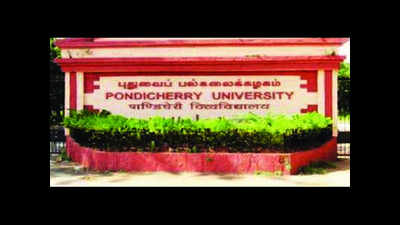- News
- City News
- puducherry News
- Pondicherry University: EWS quota for associate professor posts sparks controversy
Trending
This story is from August 10, 2019
Pondicherry University: EWS quota for associate professor posts sparks controversy
The reservation for economically weaker sections (EWS) in the recruitment of associate professors and professors in Pondicherry University has sparked a fresh controversy.

Pondicherry University
PUDUCHERRY: The reservation for economically weaker sections (EWS) in the recruitment of associate professors and professors in Pondicherry University has sparked a fresh controversy.
The university published a notification dated August 6 for recruitment of 67 assistant professors, 68 associate professors and 44 professors in various disciplines. It reserved six seats each for the posts of assistant professor and associate professor and four seats for the post of professor under the EWS quota.
There is no major objection to the university’s move to extend EWS quota for assistant professor post as it is an entry-level post inviting applications from unemployed candidates, who meet the eligibility criteria. However, the varsity’s move to reserve six associate professor seats and four professor seats under EWS quota has sparked an uproar.
Political leaders including PMK founder S Ramadoss came down heavily on the university and termed its move as an attempt to recruit affluent people in the upper castes under the guise of extending EWS quota.
An assistant professor with eight years’ experience will draw a salary of roughly Rs 12 lakh per annum while an associate professor with 10 years’ experience will draw a salary of roughly Rs 18 lakh per annum. Hence, the question of extending EWS quota to these posts do not arise as the candidates applying for these posts must be drawing salary more than Rs 8 lakh per annum. EWS are people whose family income is below Rs 8 lakh per annum.
The university sources maintained that the administration decided to extend EWS reservation for the teaching faculty posts following an increase in the number of students joining the institution under the EWS quota. So, we decided to increase the number of teaching faculty members under EWS quota in proportion to the increase in the number of students under the category, said a top university official.
Ramadoss while registering his strong objection to the university’s move said none of the candidates, who fulfil the UGC norms, will be eligible to apply for the posts of associate professor and professor under EWS quota. He expressed his apprehensions on the possibilities of large-scale malpractices in the recruitment of teaching faculty posts in the university. He feared that EWS quota will be misused for recruiting affluent people from the upper castes.
“It will be a worst-ever violation of rules and regulation and murder of social justice,” he said.
Ramadoss said at a time when there have been objections for EWS quota, the bid to extend the quota for affluent people from upper castes drawing more than Rs 8 lakh per annum as salary must be nipped in the bud.
The university published a notification dated August 6 for recruitment of 67 assistant professors, 68 associate professors and 44 professors in various disciplines. It reserved six seats each for the posts of assistant professor and associate professor and four seats for the post of professor under the EWS quota.
There is no major objection to the university’s move to extend EWS quota for assistant professor post as it is an entry-level post inviting applications from unemployed candidates, who meet the eligibility criteria. However, the varsity’s move to reserve six associate professor seats and four professor seats under EWS quota has sparked an uproar.
Political leaders including PMK founder S Ramadoss came down heavily on the university and termed its move as an attempt to recruit affluent people in the upper castes under the guise of extending EWS quota.
As per the University Grants Commission’s norms, the candidates with PhD and a minimum eight years of teaching or research experience in a position equivalent to that of an assistant professor can apply for the associate professor post. Similarly, the candidates with a minimum 10 years of teaching or research experience in a position equivalent to that of an associate professor can apply for the professor post.
An assistant professor with eight years’ experience will draw a salary of roughly Rs 12 lakh per annum while an associate professor with 10 years’ experience will draw a salary of roughly Rs 18 lakh per annum. Hence, the question of extending EWS quota to these posts do not arise as the candidates applying for these posts must be drawing salary more than Rs 8 lakh per annum. EWS are people whose family income is below Rs 8 lakh per annum.
The university sources maintained that the administration decided to extend EWS reservation for the teaching faculty posts following an increase in the number of students joining the institution under the EWS quota. So, we decided to increase the number of teaching faculty members under EWS quota in proportion to the increase in the number of students under the category, said a top university official.
Ramadoss while registering his strong objection to the university’s move said none of the candidates, who fulfil the UGC norms, will be eligible to apply for the posts of associate professor and professor under EWS quota. He expressed his apprehensions on the possibilities of large-scale malpractices in the recruitment of teaching faculty posts in the university. He feared that EWS quota will be misused for recruiting affluent people from the upper castes.
“It will be a worst-ever violation of rules and regulation and murder of social justice,” he said.
Ramadoss said at a time when there have been objections for EWS quota, the bid to extend the quota for affluent people from upper castes drawing more than Rs 8 lakh per annum as salary must be nipped in the bud.
End of Article
FOLLOW US ON SOCIAL MEDIA










